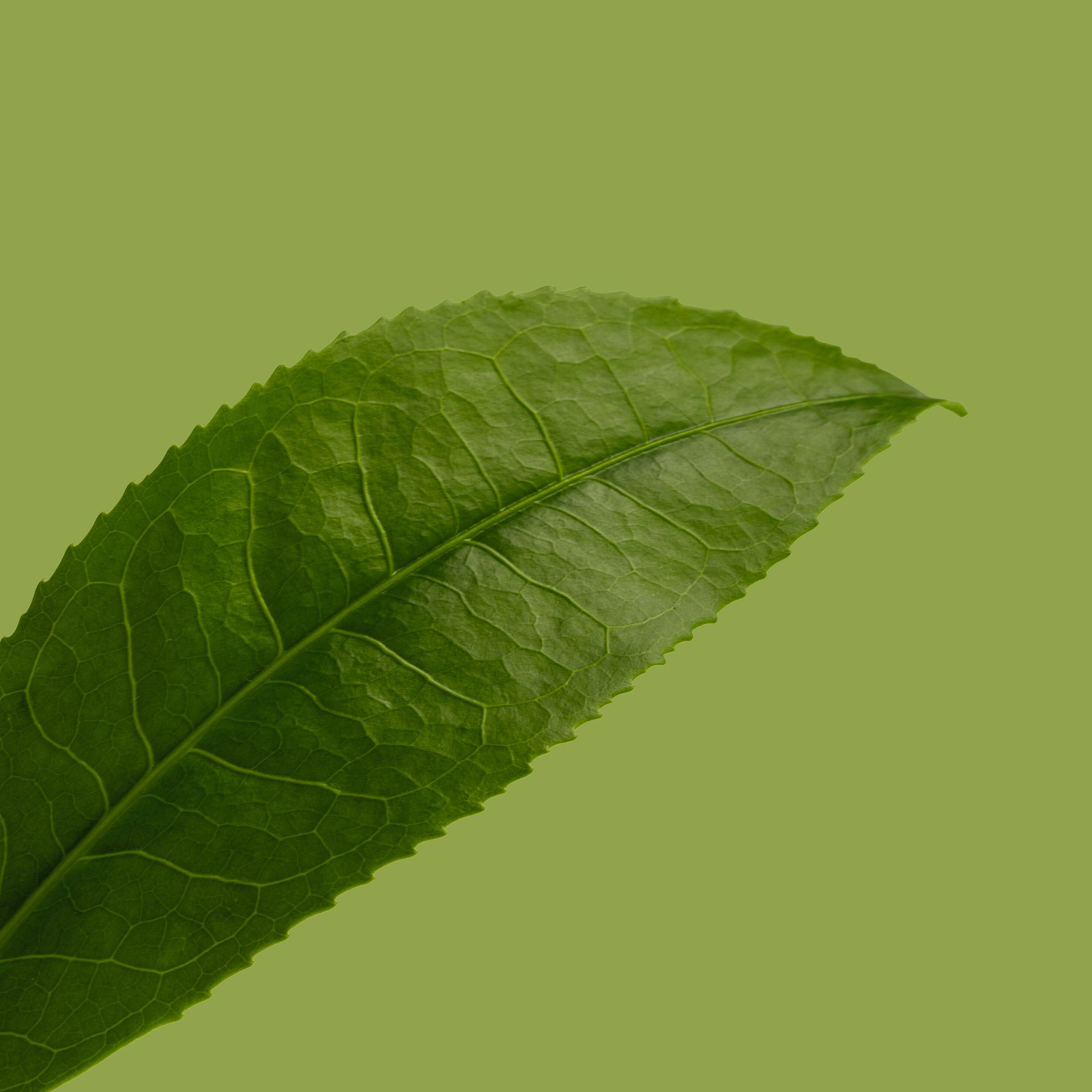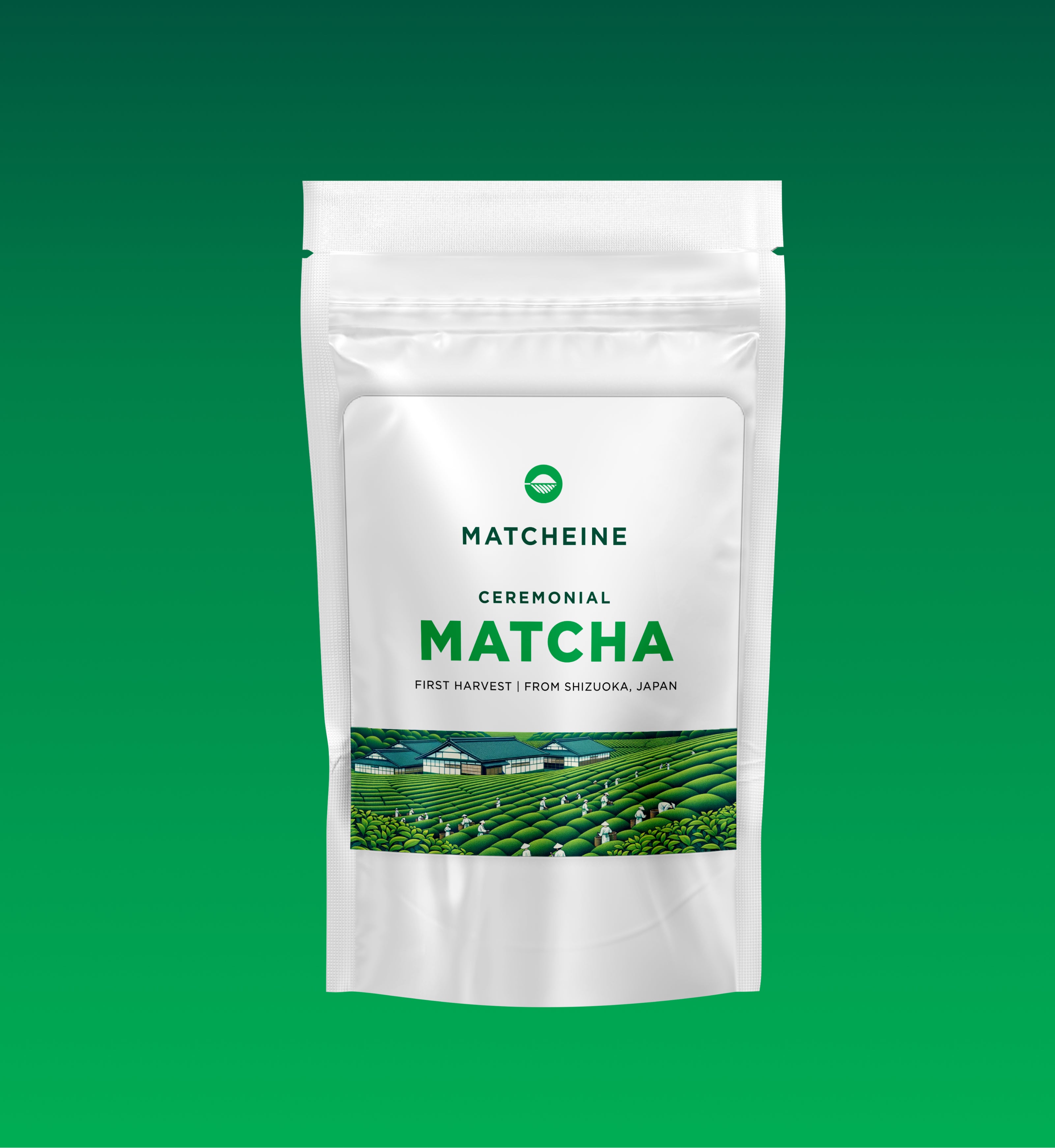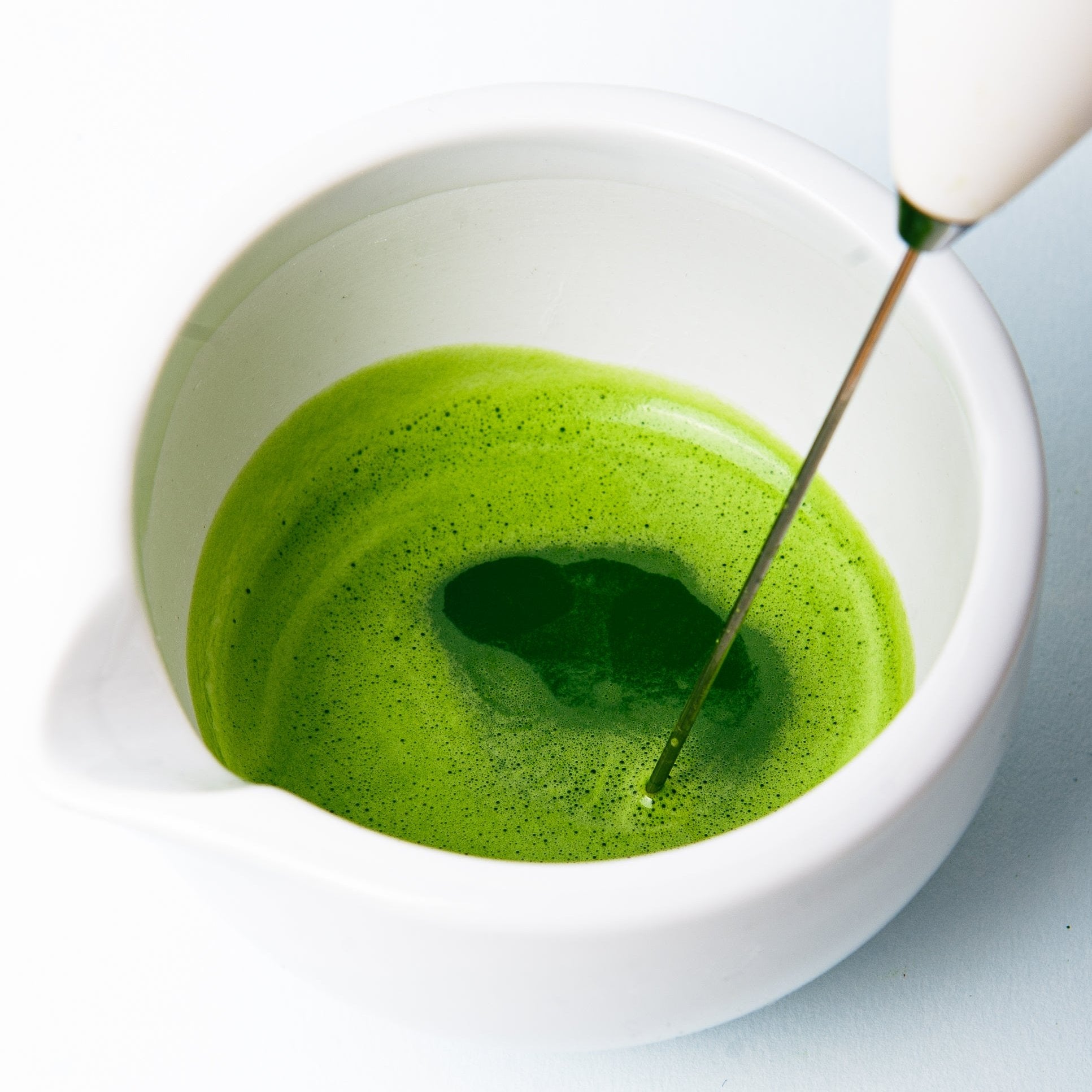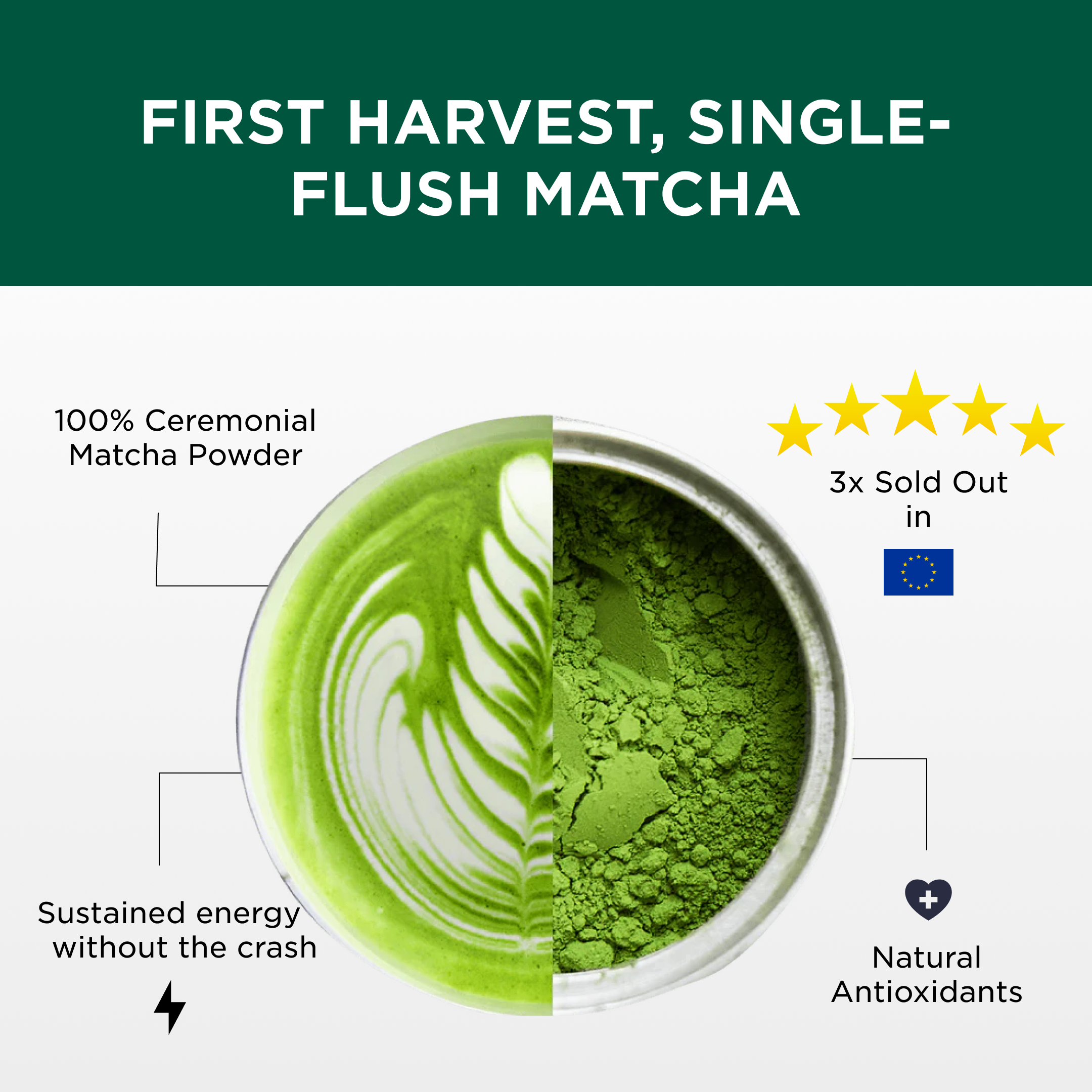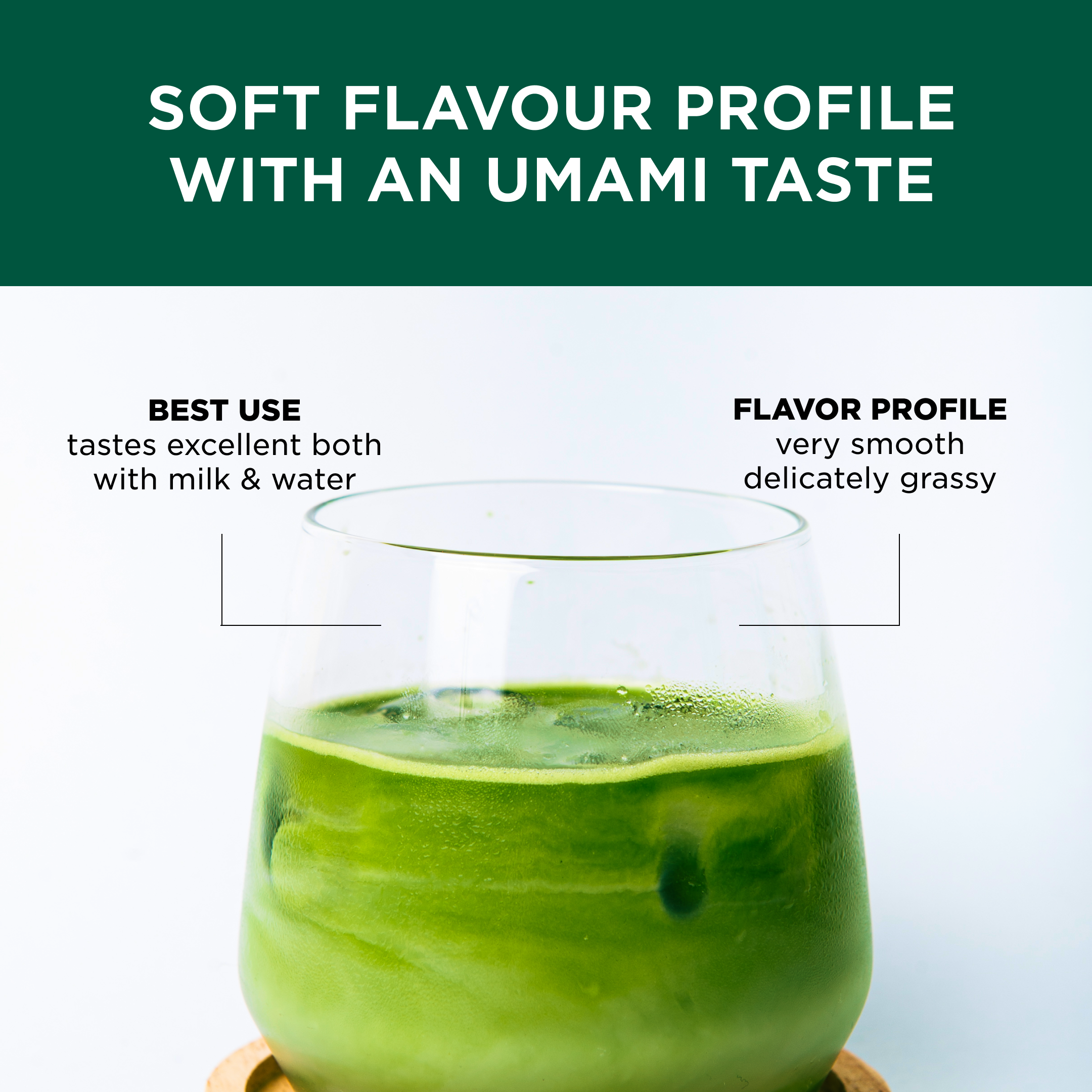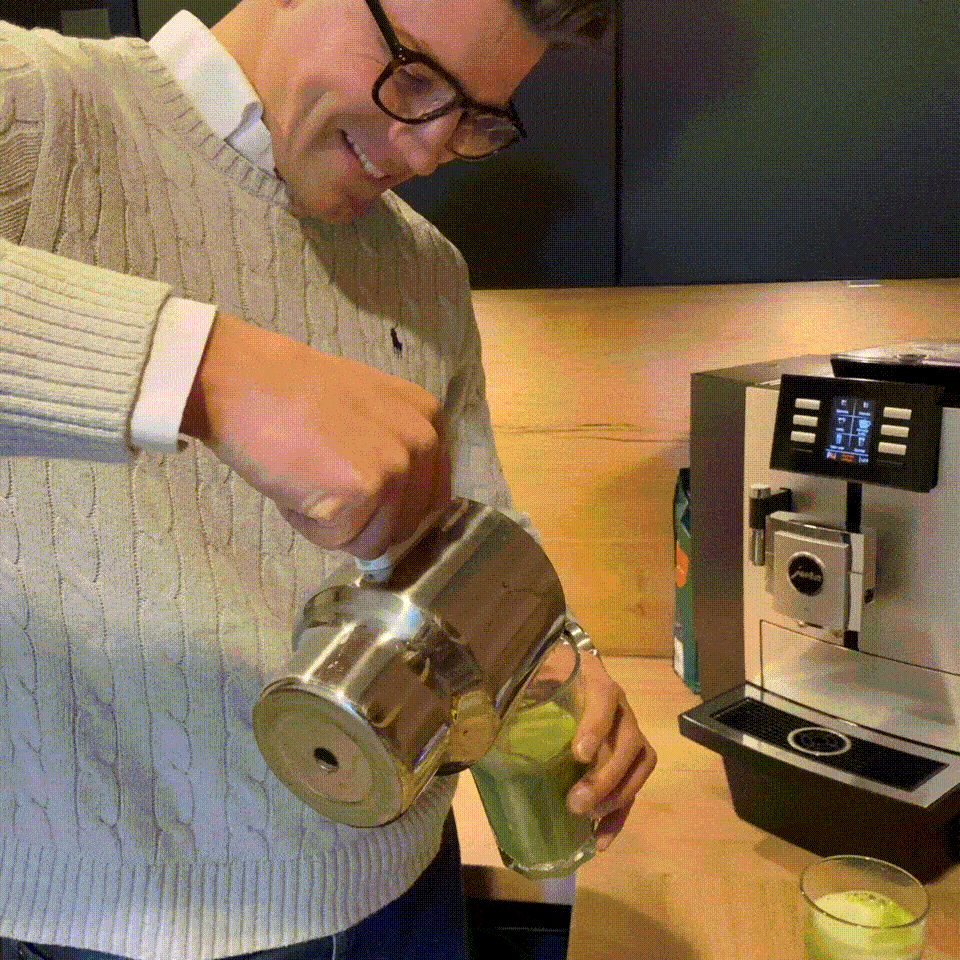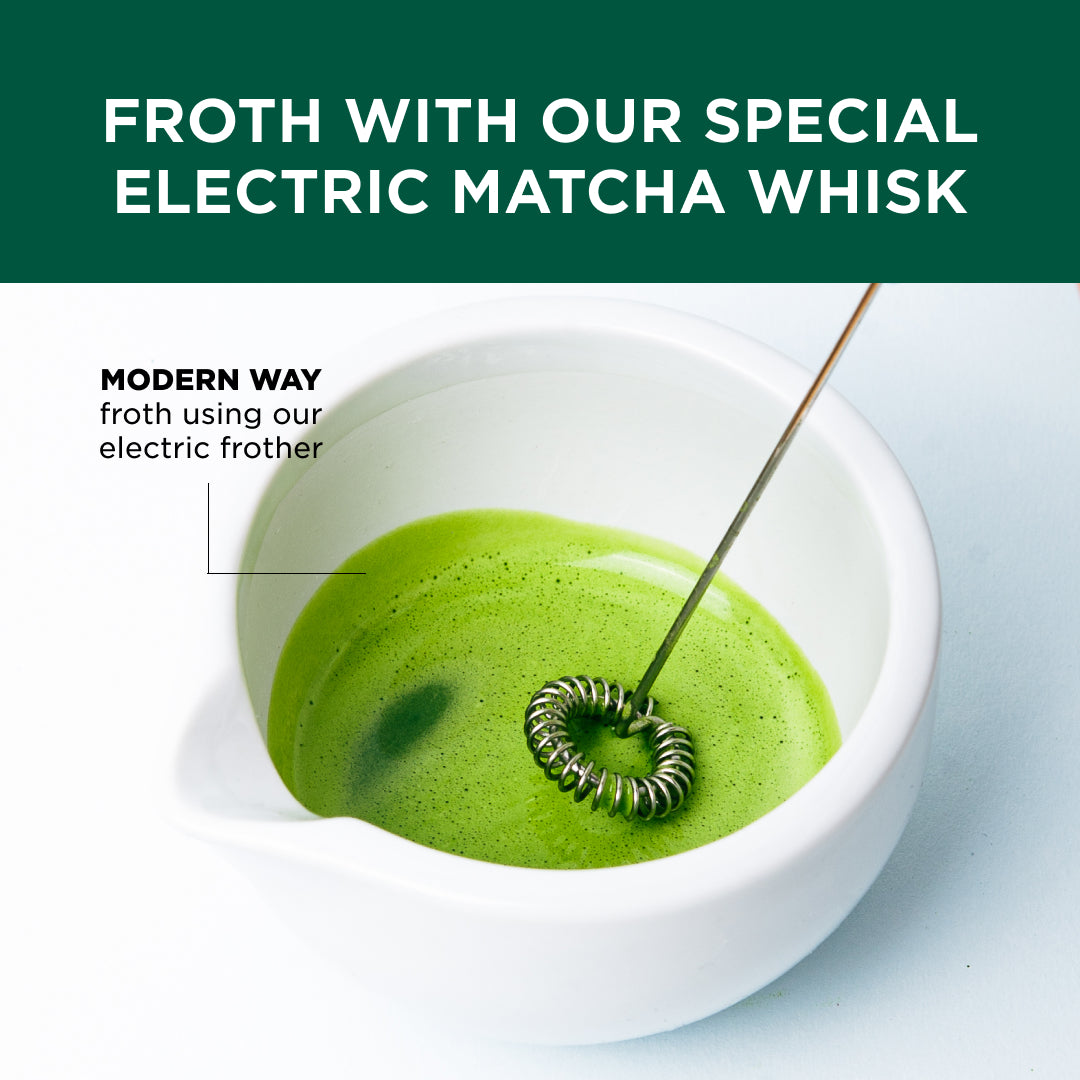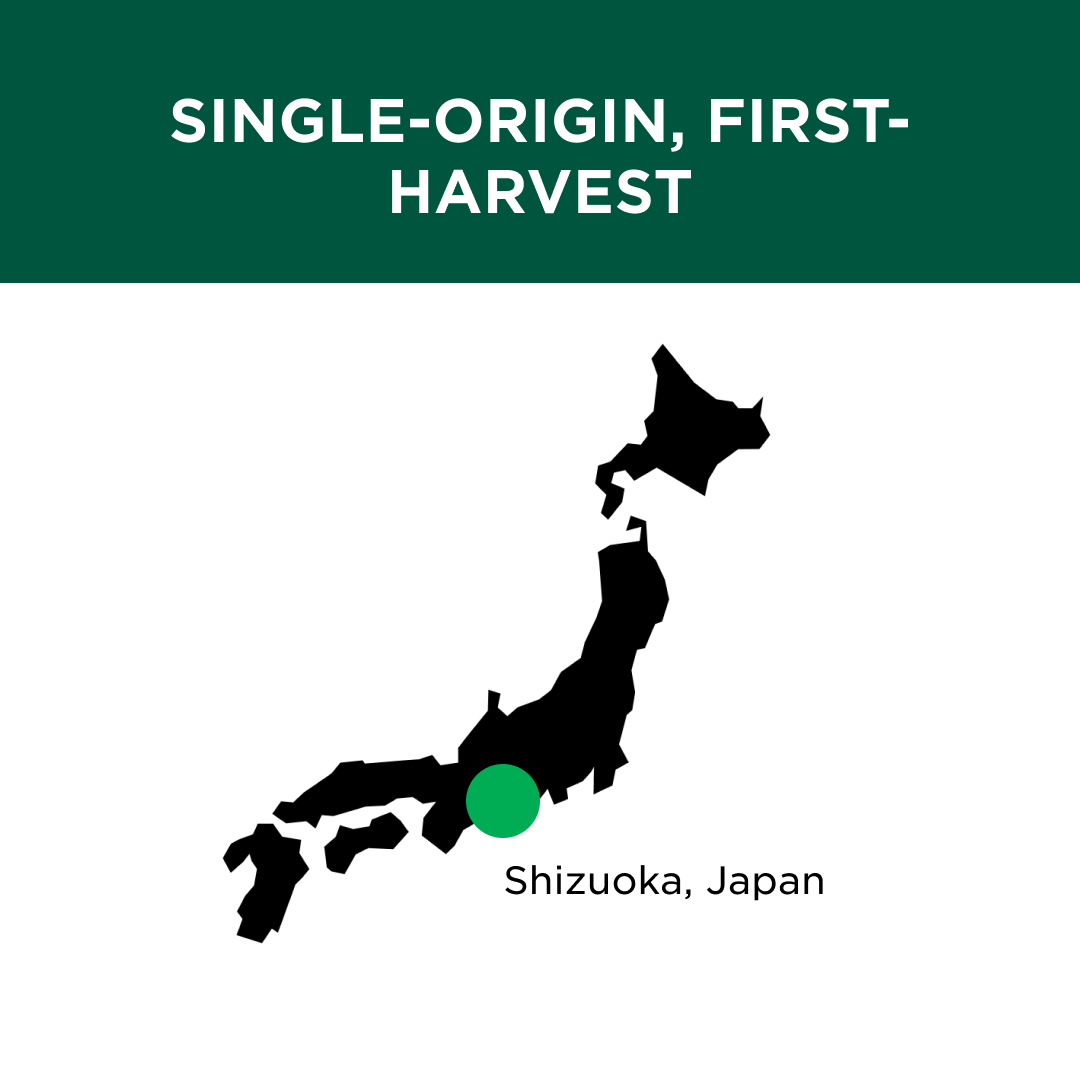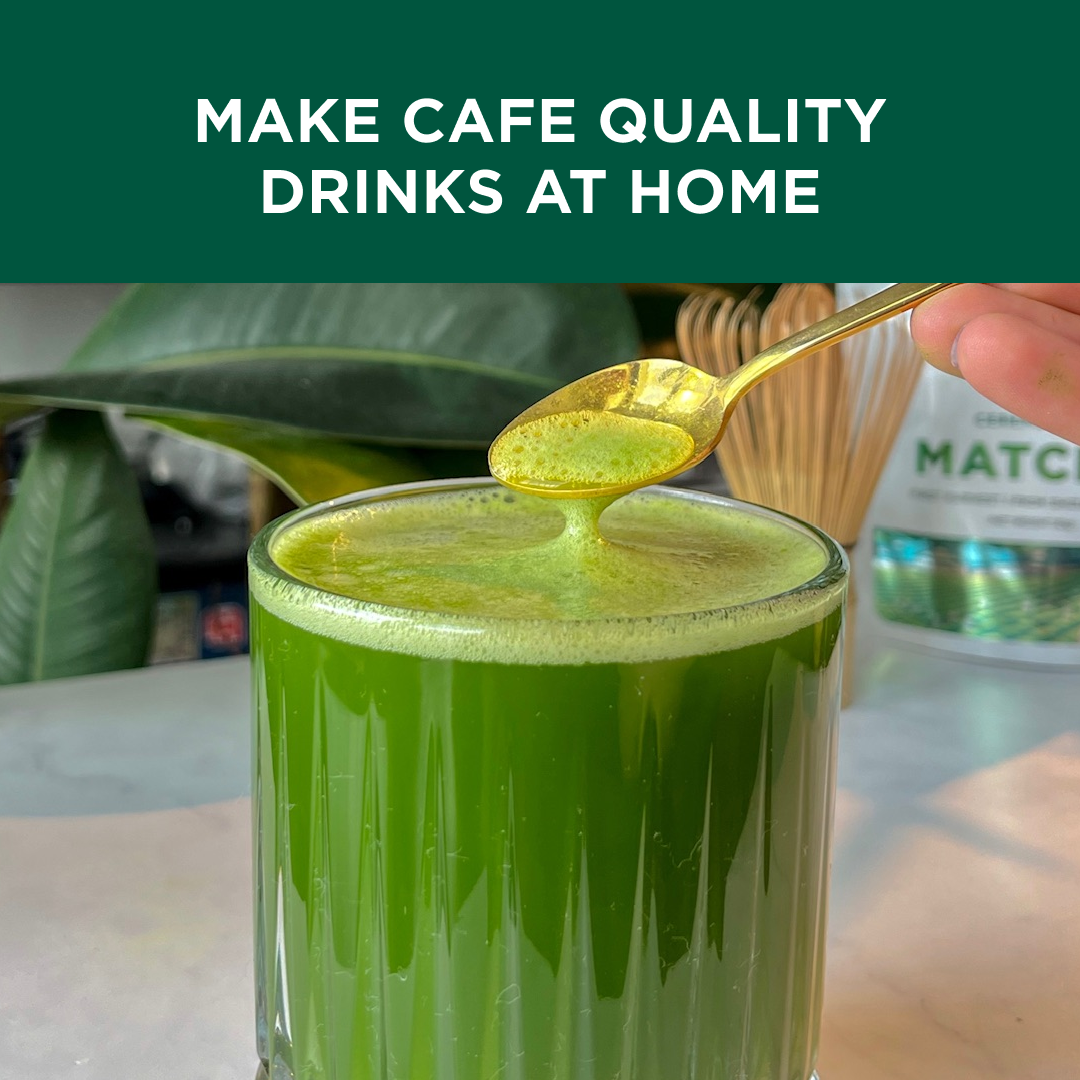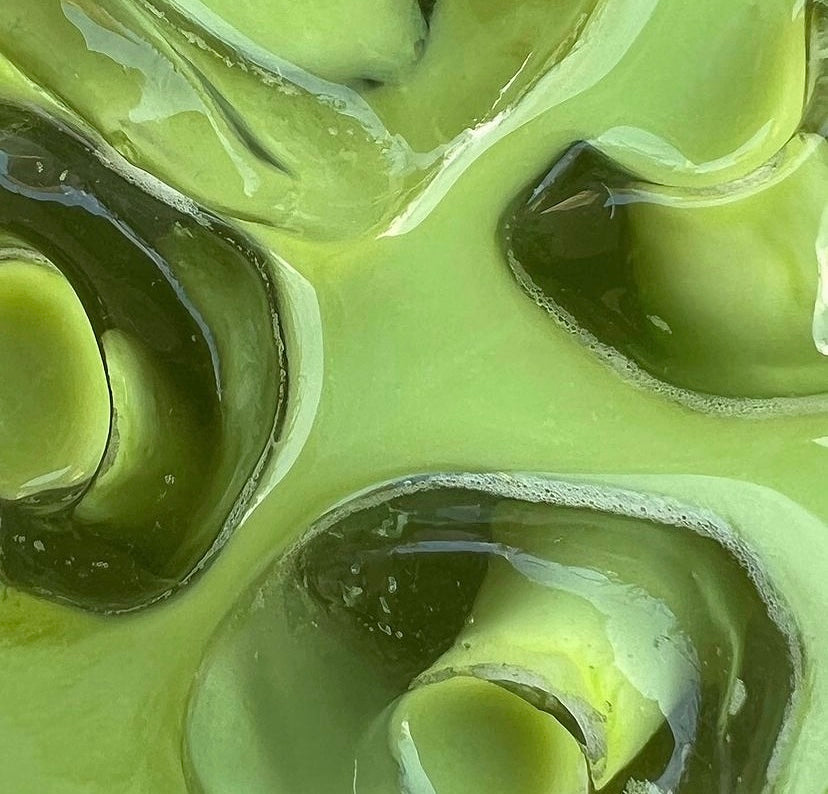Can matcha boost your energy levels? Absolutely, and this is largely due to its caffeine content.
A typical serving of matcha (about 1 teaspoon or 2 grams) can contain between 40 to 70 mg of caffeine.
In comparison, a single cup of brewed coffee usually has around 100mg of caffeine, while a double espresso shot often contains about 120mg, as reported by Consumer Reports.
However, matcha has an edge in terms of sustaining alertness—it keeps you alert for 4-6 hours, as opposed to the 1-2 hours from coffee. This means you don't have to consume as much to enjoy the energizing effects.
Type of Caffeine & how it's released
Matcha offers a distinctive experience with caffeine compared to other common sources like coffee or energy drinks. The key difference lies in how the caffeine is released and how it interacts with the body, which contributes to a smoother and more prolonged energy boost.
Type of Caffeine in Matcha
- Whole Leaf Consumption: In matcha, you consume the entire leaf in powdered form, not just an infusion from the leaves. This means you ingest all the caffeine contained in the leaves.
- L-Theanine Synergy: Matcha contains L-Theanine, an amino acid that works in synergy with caffeine. This combination is rare and crucial in modulating the effects of caffeine. L-Theanine promotes relaxation without drowsiness and, when combined with caffeine, has been shown to improve brain function.
Release and Impact on the Body
- Gradual Absorption: The presence of L-Theanine in matcha slows down the body's absorption of caffeine. Instead of the rapid uptake and quick release of caffeine typically experienced with coffee, matcha offers a more gradual, sustained release.
- Longer-Lasting Effects: This slower absorption leads to a prolonged period of alertness. While coffee might give you an immediate jolt of energy, often followed by a quick crash, matcha provides a more consistent level of energy.
- No 'Crash' Effect: The 'crash' commonly associated with other caffeinated drinks is largely absent with matcha. This is because the gradual decrease in caffeine levels prevents the sudden drop in energy levels. Matcha users often report a smooth, steady decline in alertness, rather than a rapid drop-off.
Matcha vs Green Tea
Matcha and green tea differ significantly in their caffeine content and antioxidant levels. Understanding these numerical differences can help you choose the right option for your health and energy needs.
Caffeine Content
-
Matcha: The caffeine content in matcha is notably higher than in regular green tea. A typical serving of matcha (about 1 teaspoon or 2 grams) can contain between 40 to 70 mg of caffeine. This variance depends on the quality and preparation of the matcha.
-
Green Tea: A standard cup of green tea, which usually involves steeping about 2 grams of loose-leaf tea or a tea bag, contains approximately 15 to 30 mg of caffeine.
The difference in caffeine content can be attributed to the fact that matcha uses the entire tea leaf, resulting in a more concentrated form of caffeine, as opposed to green tea where only the essence of the leaf is steeped in water.
Antioxidant Levels
-
Matcha: One of the most notable antioxidants in matcha is epigallocatechin gallate (EGCG). Matcha is rich in this compound, offering about 60 mg of EGCG per gram. It's also packed with other antioxidants, including catechins and polyphenols, which are more concentrated than in green tea due to the consumption of the whole leaf.
-
Green Tea: While green tea is a good source of antioxidants, the concentration of EGCG and other beneficial compounds is lower. On average, green tea contains about 25 to 35 mg of EGCG per gram.
Other Nutritional Differences
Besides caffeine and antioxidants, matcha also has higher concentrations of amino acids, particularly L-Theanine, which contributes to its calming effects. The process of shading the matcha leaves before harvest increases the L-Theanine and chlorophyll content, making it nutritionally richer than its green tea counterpart.
Matcha vs Coffee
Matcha and coffee are both popular beverages known for their caffeine content and energy-boosting properties. However, they offer distinct experiences and health benefits.
Caffeine Content
-
Matcha: As mentioned earlier, a typical serving of matcha (about 1 teaspoon or 2 grams) contains between 40 to 70 mg of caffeine. The caffeine release in matcha is more gradual, leading to a longer-lasting and steadier energy boost without the jitters or crash often associated with coffee.
-
Coffee: A standard 8-ounce cup of coffee typically contains about 95 to 200 mg of caffeine, depending on the variety and brewing method. Coffee delivers caffeine quickly into the bloodstream, resulting in a rapid energy boost followed by a potential abrupt crash.
Health Benefits
-
Matcha: Beyond caffeine, matcha is rich in antioxidants like EGCG, which is known for its potential to reduce inflammation, aid in weight loss, and improve heart and brain health. Matcha also contains L-Theanine, which promotes relaxation and mental clarity.
-
Coffee: Coffee is also a source of antioxidants, including chlorogenic acids, which may help in reducing inflammation and protecting against certain diseases. However, it lacks the amino acid L-Theanine and other specific compounds found in matcha.
Matcha vs Energy Drinks
Matcha and energy drinks are often consumed for their energizing effects, but they differ vastly in their nutritional profiles and health impacts.
Caffeine Content
-
Matcha: With 40 to 70 mg of caffeine per serving, matcha provides a more controlled release of energy compared to most energy drinks.
-
Energy Drinks: The caffeine content in energy drinks can vary widely, ranging from about 50 mg to over 300 mg per serving. Energy drinks often cause a quick spike in energy, which can be followed by a rapid crash.
Other Ingredients and Health Implications
-
Matcha: Matcha is purely natural and does not contain added sugars or artificial ingredients. Its health benefits include improved metabolism, antioxidant protection, and a calming effect on the mind.
-
Energy Drinks: Many energy drinks contain high levels of added sugars, artificial flavors, and other stimulants like taurine and guarana. These can lead to increased heart rate, blood pressure, and potential negative impacts on heart health. The high sugar content can also contribute to weight gain and dental issues.
Absorption of Caffeine from Matcha
When you consume matcha, the way your body processes the caffeine is notably different from coffee. This difference helps in mitigating many of the side effects typically associated with coffee consumption.
In matcha, caffeine molecules are interlinked with larger catechin molecules. Catechins are potent antioxidants that the body gradually breaks down and assimilates. This interaction results in a slower release of caffeine into the bloodstream. Due to this gradual process, matcha provides a steady, extended energy boost lasting about 6-8 hours.
The slower digestion and assimilation of caffeine in matcha lead to a more sustained and even energy level, without the rapid spikes and crashes often associated with coffee.
How the Body Processes Caffeine from Coffee
In contrast, the caffeine in coffee is absorbed and metabolized more quickly by the body. This rapid process often leads to spikes in adrenaline, glucose, and insulin levels. These spikes are the primary reason why many coffee drinkers experience a sudden surge in energy, followed by a 'crash,' as their blood sugar levels drop. This crash can manifest as tiredness, irritability, or even a feeling of lethargy.


